Related Research Articles

Slide guitar is a technique for playing the guitar that is often used in blues music. It involves playing a guitar while holding a hard object against the strings, creating the opportunity for glissando effects and deep vibratos that reflect characteristics of the human singing voice. It typically involves playing the guitar in the traditional position with the use of a slide fitted on one of the guitarist's fingers. The slide may be a metal or glass tube, such as the neck of a bottle, giving rise to the term bottleneck guitar to describe this type of playing. The strings are typically plucked while the slide is moved over the strings to change the pitch. The guitar may be placed on the player's lap and played with a hand-held bar.
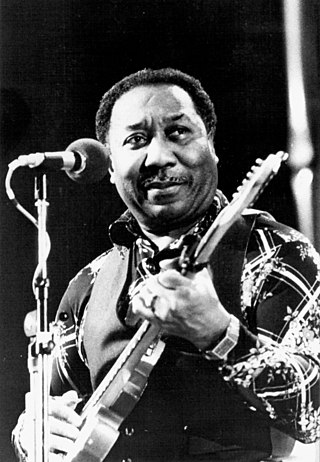
McKinley Morganfield, known professionally as Muddy Waters, was an American blues singer and musician who was an important figure in the post-World War II blues scene, and is often cited as the "father of modern Chicago blues". His style of playing has been described as "raining down Delta beatitude".

Muddy Waters (1913–1983) was an American blues artist who is considered a pioneer of the electric Chicago blues and a major influence on the development of blues and rock music. He popularized several early Delta blues songs, such as "Rollin' and Tumblin'", "Walkin' Blues", and "Baby, Please Don't Go", and recorded songs that went on to become blues standards, including "Hoochie Coochie Man", "Mannish Boy", and "Got My Mojo Working". During his recording career from 1941 to 1981, he recorded primarily for two record companies, Aristocrat/Chess and Blue Sky; they issued 62 singles and 13 studio albums.

Chester Arthur Burnett, better known by his stage name Howlin' Wolf, was an American blues singer and guitarist. He was at the forefront of transforming acoustic Delta blues into electric Chicago blues, and over a four-decade career, recorded blues, rhythm and blues, rock and roll, and psychedelic rock. He is regarded as one of the most influential blues musicians of all time.

Paul Vaughn Butterfield was an American blues harmonica player, singer and bandleader. After early training as a classical flautist, he developed an interest in blues harmonica. He explored the blues scene in his native Chicago, where he met Muddy Waters and other blues greats, who provided encouragement and opportunities for him to join in jam sessions. He soon began performing with fellow blues enthusiasts Nick Gravenites and Elvin Bishop.

Chess Records was an American record company established in 1950 in Chicago, specializing in blues and rhythm and blues. It was the successor to Aristocrat Records, founded in 1947. It expanded into soul music, gospel music, early rock and roll, and jazz and comedy recordings, released on the Chess and its subsidiary labels Checker and Argo/Cadet. The Chess catalogue is owned by Universal Music Group and managed by Geffen Records and Universal Music Enterprises.

George "Buddy" Guy is an American blues guitarist and singer. He is an exponent of Chicago blues who has influenced generations of guitarists including Eric Clapton, Jimi Hendrix, Jimmy Page, Keith Richards, Stevie Ray Vaughan, Jeff Beck, Gary Clark Jr. and John Mayer. In the 1960s, Guy played with Muddy Waters as a session guitarist at Chess Records and began a musical partnership with blues harp virtuoso Junior Wells.
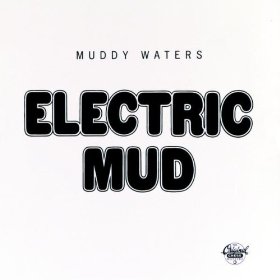
Electric Mud is the fifth studio album by Muddy Waters, with members of Rotary Connection playing as his backing band. Released in 1968, it presents Muddy Waters as a psychedelic musician. Producer Marshall Chess suggested that Muddy Waters record it in an attempt to appeal to a rock audience.

Rotary Connection was an American psychedelic soul band, formed in Chicago in 1966.

James Henry Cotton was an American blues harmonica player, singer and songwriter, who performed and recorded with many fellow blues artists and with his own band. He also played drums early in his career.

"Mannish Boy" is a blues standard written by Muddy Waters, Mel London, and Bo Diddley. First recorded in 1955 by Waters, it serves as an "answer song" to Bo Diddley's "I'm a Man", which was in turn inspired by Waters' and Willie Dixon's "Hoochie Coochie Man". "Mannish Boy" features a repeating stop-time figure on one chord throughout the song.

Marc Levin is an American independent film producer and director. He is best known for his Brick City TV series, which won the 2010 Peabody award and was nominated for an Emmy for Exceptional Merit in Nonfiction Filmmaking and his dramatic feature film, Slam, which won the Grand Jury Prize at the Sundance Film Festival and the Caméra d'Or at Cannes in 1998. He also has received three Emmy Awards and the 1997 DuPont-Columbia Award.

At Newport 1960 is a live album by Muddy Waters recorded during his performance at the Newport Jazz Festival on July 3, 1960. With his longtime backup band, Muddy Waters plays a mix of his older popular tunes and some newer compositions. Chess Records released the album in the United States on November 15, 1960.
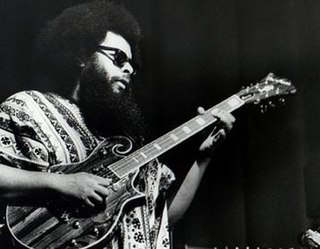
Peter Palus Cosey was an American guitarist who played with Miles Davis' band between 1973 and 1975. His fiercely flanged and distorted guitar invited comparisons to Jimi Hendrix. Cosey kept a low profile for much of his career and released no solo recorded works. He appeared on Davis's albums Get Up with It (1974), Agharta (1975), Pangaea (1976), Dark Magus (1977), and The Complete On the Corner Sessions (2007).

Marshall Chess is an American record producer, the son of Leonard Chess who co-founded Chess Records.
The Blues is a 2003 documentary film series produced by Martin Scorsese, dedicated to the history of blues music. In each of the seven episodes, a different director explores a stage in the development of the blues. The series originally aired on PBS in the United States.
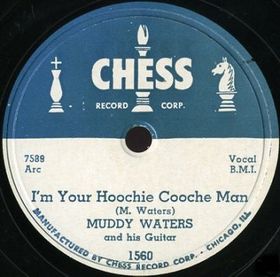
"Hoochie Coochie Man" is a blues standard written by Willie Dixon and first recorded by Muddy Waters in 1954. The song makes reference to hoodoo folk magic elements and makes novel use of a stop-time musical arrangement. It became one of Waters' most popular and identifiable songs and helped secure Dixon's role as Chess Records' chief songwriter.

The Howlin' Wolf Album is the first studio album by Howlin' Wolf, released in 1969. It features members of Rotary Connection as his backing band. The album mixed blues with psychedelic rock arrangements of several of Wolf's classic songs. Howlin' Wolf strongly disliked the album, which is noted on the album's cover art. The album peaked at number 69 on Billboard magazine's "Black Albums" chart.
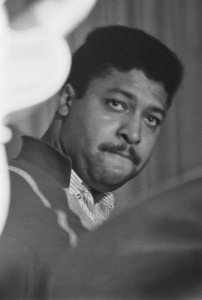
Samuel Julian Lay was an American drummer and vocalist who performed from the late 1950s as a blues and R&B musician alongside Little Walter, Howlin' Wolf, Paul Butterfield, and many others. He was inducted into the Rock and Roll Hall of Fame in 2015.

Larry "Mud" Morganfield is an American blues singer and the eldest son of Muddy Waters.
References
- ↑ Goldberg, Michael Alan (September 25, 2003). "Blues All Around Me". Miami New Times. Archived from the original on December 10, 2019. Retrieved December 10, 2019.
- 1 2 Gallo, Phil (September 3, 2003). "Godfathers & Sons". Variety. Archived from the original on December 10, 2019. Retrieved December 10, 2019.
- ↑ Harrington, Richard (August 29, 2003). "Blues on Television From ..." Washington Post. ISSN 0190-8286. Archived from the original on May 29, 2024. Retrieved December 10, 2019.
- ↑ "The Blues A Musical Journey: Godfathers and Sons". Time Out New York. Archived from the original on 2019-12-10. Retrieved 2019-12-10.